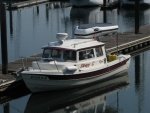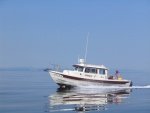The important issue is that GPS location, and thus course, and speed, measures the distance, speed and direction over the bottom or ground. Although it is loosely called "Triangulation", the more precise term is "Trilateration" which is more complex than plain geometry of triangulation.
The satellite knows its precise position, the GPS uses at least 3 satellites, and the very precise time difference, to determine the difference in position from that of each satellite. Technically there are no plain angles measured, as one would in navigation by triangulation. (For instance you can see a light house, a smoke stack, and another known object. If you use a polaris, or other precise instrument, such as a sextant or quadrant, to measure the angles, then your position is determined by triangulation. In the GPS, the position is by an extremely accurate clock. Many of the newest GPS also use the Russian satellite systems: GLONASS. Plus they update 10 times per second.
I agree that idle of one the modern 4 stroke 90's is fine. But I would still run the RPM up every few hours. Be sure that your outboard is running at recommended temperature. Also use one of the additives such as "Yamaha, Ring Free Plus", as well as your normal Stabil, Startron (OK, may be hocus pocus) or other ethanol defeating products… Even the 2 stroke Yamaha's idled fairly well for longer times--the EFI 4 strokes far better.


